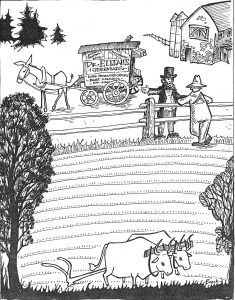You are called to freedom
June 26, 2016
THIRTEENTH SUNDAY IN ORDINARY TIME
1 Kgs 19:16, 19-21
Elisha is called to follow Elijah
Ps 16:1-2, 5, 7-11
You are my allotted portion
Gal 5:1, 13-18
You are called to freedom
Lk 9:51-62
The journey to Jerusalem begins
http://www.usccb.org/bible/readings/ 062616.cfm
Luke’s Gospel has a special feeling for Elijah. Where the other Gospels connect Elijah to John the Baptist, Luke relates the prophet to Jesus. You will remember that in the opening episode in Jesus’ public life in this Gospel Jesus read from the scroll in the synagogue of Nazareth. Among his comments, Jesus suggested that he would go to those elsewhere, and cited example of Elijah and Elisha (Lk 4:23-28). And just a couple of weeks ago we heard about the widow of Nain, whose son Jesus raised to life, in the manner of Elijah.
 Now we build on that. We hear that the disciples of Jesus also are like Elijah. If we keep the first reading in mind, with its call of Elisha, Elijah’s successor, then we can be more accurate. We can say that just as Jesus is like Elijah, so the disciples of Jesus are like the disciples of Elijah.
Now we build on that. We hear that the disciples of Jesus also are like Elijah. If we keep the first reading in mind, with its call of Elisha, Elijah’s successor, then we can be more accurate. We can say that just as Jesus is like Elijah, so the disciples of Jesus are like the disciples of Elijah.
Elisha was apparently a wealthy man. Twelve yoke of oxen is no small operation. His sacrifice, and offering their flesh for a meal, signifies total abandonment of his former way of life and a commitment to the new. One is reminded of other call stories, such as the Gospel account of Peter and Andrew, James and John, who “left everything” and followed Jesus. Or that other rich man who had many belongings, and then failed the call (Luke 18:18-30). Here Elisha is the model disciple.
In the Gospel account for today we have an encounter and three call stories. The encounter involves the lack of welcome that Jesus and his followers receive from a village in Samaria. In the manner of Elijah, who famously disputed with the priests of Baal, successfully calling down fire on his sacrifice, when they could not, the disciples James and John wish to call down fire on the village. Jesus demurs.
The three call stories link with the disciple Elisha. In the third of these, Jesus warns that no one who sets a hand to plow and looks back is fit for the kingdom of God. We are to think of Elisha and his sacrificed oxen and plows, and his complete disengagement from his former life. The other two Gospel passages illustrate this principle. Jesus is one who has nowhere to lay his head, and to follow him has implications for the follower. And the one who would bury his father, like him who would turn back to attend to his family needs, illustrates the principle of making a decisive break.
At the beginning of today’s Gospel story, we read, “When the days for Jesus’ being taken up were fulfilled, he resolutely determined to journey to Jerusalem.” This marks the beginning of a special section of Luke. He has greatly elaborated the journey to Jerusalem. In Mark’s Gospel, one of Luke’s sources, this journey takes up little more than two chapters (8:31—10:52). In Luke, it is 10 chapters in length (9:51—19:27). Most of the episodes in this section are to be found only in Luke’s Gospel. It seems that Luke had a special source, unshared by the other Gospel writers.
The journey to Jerusalem will preoccupy us in the Sunday liturgies until the 31st Sunday of Ordinary time. That would be October 30, two days before All Saints!
We will see in the coming weeks that Luke shows Jesus interacting with three groups—the disciples, the Pharisees and the crowds. Each interaction has its own character. Also, often enough there is another group listening in, and sometimes interrupting. We will try to keep track of these in the coming discussions.
For reflection: In what ways do we experience the complete dedication of the call to discipleship?
Father Beck is professor emeritus of religious studies at Loras College, Dubuque.




